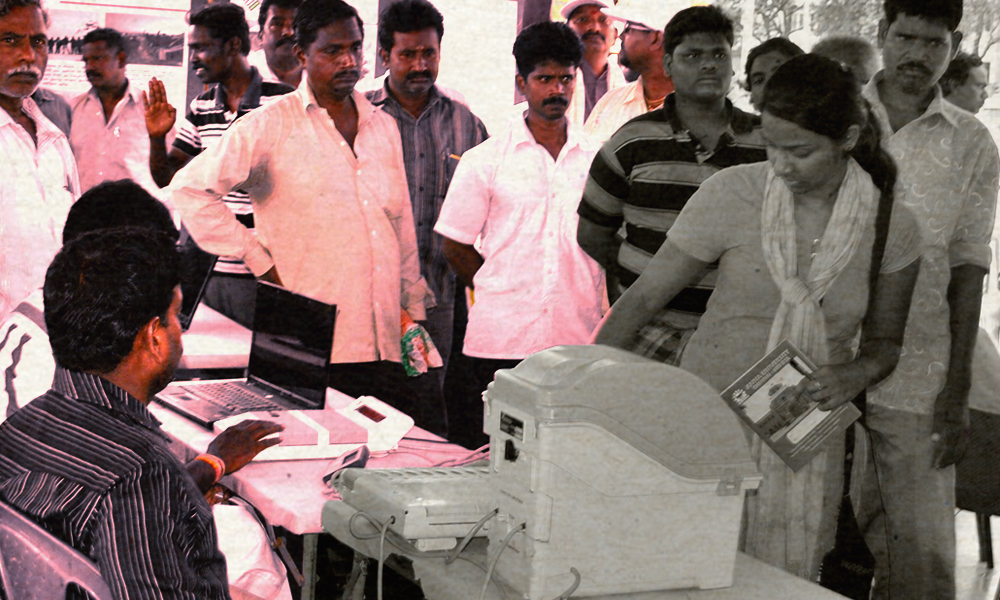
Poll Staff, Voters Generated 160 Tonnes Of Biomedical Waste During Bihar Elections
Writer: Navya Singh
Navya writes and speaks about matters that often do not come out or doesn’t see daylight. Defense and economy of the country is of special interest to her and a lot of her content revolves around that.
Bihar, 16 Nov 2020 8:43 AM GMT
Creatives : Rajath
A free spirit who find meaning in life with the virtue of creativity and doing job par its excellence, animal lover and traveller by heart.
The Election Commission had procured 18 lakh face shields, 70 lakh face masks, 5.4 lakh single-use rubber gloves for polling and security personnel, 29 lakh hand sanitiser bottles of 100 and 500 ml for the safety of voters & polling personnel amid pandemic.
At least 160 tonnes of biomedical waste including gloves, face masks and sanitiser bottles used by polling personnel and voters were generated during the Bihar assembly polls held amid the Coronavirus pandemic, poll authorities in the state said.
The Election Commission had procured 18 lakh face shields, 70 lakh face masks, 5.4 lakh single-use rubber gloves for polling and security personnel, 29 lakh hand sanitiser bottles of 100 and 500 ml and 7.21 crore 'one hand' single-use polythene gloves for voters to press the EVM button and sign the register at the polling stations. The steps were taken in order to ensure the safety of voters, polling staff and security personnel in Bihar amid the deadly pandemic.
The office of the Chief Electoral Officer of Bihar and the state health department together prepared the "COVID safety material" for the three-phase elections, The Wire reported.
"They have trained for disposal of the safety material also. It could be littered anywhere," Bihar Chief Electoral Officer H R Srinivas said, adding that 160 tonnes of biomedical waste were generated.
The State Chief Electoral Officer said that all districts have its biomedical waste (BMW) disposal agency. "The challenge was the agency would lift BMW from health centres, hospitals but not lift from polling stations. The districts then appointed BMW workers," he said.
On the election day, the workers had to place two yellow-coloured dustbins in every polling station for disposal of used masks, gloves and sanitiser bottles. A team with a vehicle and workers was tagged with 10 to 15 polling stations. After the polling was completed, the team had to pick up the dustbins and bring it to the public health centre it was tagged to. From there, the waste was then taken for incineration in polythene bags.
To track biomedical waste, poll authorities use "Election Tracking Enabled System" or Ele-Traces, an application developed by NIC.
"There is zero expenditure involved. It is a beautiful app… Two people (per vehicle) were asked to download the app and they were tracked," the state CEO explained.
India generated 18,006 tonnes of COVID-19 biomedical waste in the last four months, according to recent data released by the Central Pollution Control Board (CPCB).
The data also shows that Maharashtra contributed the maximum with 3,587 tonnes of bio-medical waste. COVID-19 biomedical waste includes PPE kits, masks, shoe covers, gloves, items contaminated with blood, body fluids like dressings, cotton swabs, beddings contaminated with blood or body fluid, blood bags, needles etc.
Nearly 5,500 tonnes of COVID-19 waste was generated across India in September, which is the maximum for a month till now. According to the data released by the apex pollution control body, all the bio-medical waste generated by states and Union Territories since June is being collected, treated and disposed of by 198 common biomedical waste treatment facilities (CBWTFs).
Recently, United Nations Industrial Development Organisation (UNIDO) representative for India, Dr René Van Berkel, stressed upon the need of waste management to halt the spread of COVID-19, that will help to block all significant infection channels.
Berkel was speaking at a webinar on 'Managing bio-medical waste to ensure near-zero infections spread among waste management workers', organised by Communeeti, a non-profit organisation. He said that biomedical waste management practices and techniques have never been required more than this time.
Also Read: India Generated Over 18,000 Tonnes COVID-19 Waste In Four Months: Central Pollution Control Board
 All section
All section














